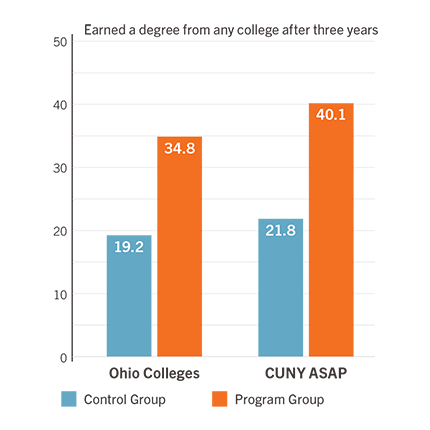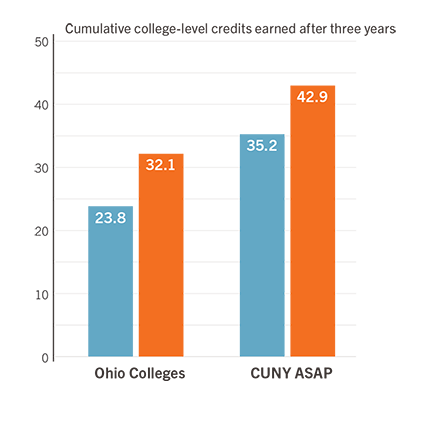CUNY ASAP Doubles Graduation Rates in New York City and Ohio


WHAT IS CUNY ASAP?
The City University of New York (CUNY) Accelerated Study in Associate Programs (ASAP) model reflects a comprehensive approach to student support that is based on leveraging students’ strengths and removing structural barriers to timely associate degree completion.
Comprehensive Program Components
| EVALUATION AND DATA USE FOR PROGRAM MANAGEMENT | ||
|---|---|---|
| Academic Momentum | Integration and Belonging | Timely and Relevant Supports |
| HIGH TOUCH ADVISEMENT | ||
| Full-time consolidated course schedule | Early engagement | Academic support services |
| Winter and summer course taking | First-year blocked courses | Career development supports |
Removal of key financial barriers:
|
Community buildingLeadership opportunities | Connection to additional campus-based resources |
THE ASAP OHIO DEMONSTRATION
In 2014, CUNY, MDRC, and the Ohio Department of Higher Education collaborated to implement and test the CUNY ASAP model at three community colleges in Ohio.
| College | Name of Program |
| Cincinnati State Technical and Community College | C-State Accelerate |
| Cuyahoga Community College | Degree in Three (D3) |
| Lorain County Community College (LCCC) | Students Accelerating in Learning (SAIL) |
What Were the Results?
MDRC’s experimental evaluation of the ASAP Ohio Demonstration found very similar results to those found in the experimental evaluation of CUNY ASAP.


REPLICATING THE ASAP MODEL: LESSONS LEARNED
In addition to the Ohio colleges, CUNY ASAP has provided technical assistance to many other institutions across the nation to develop and implement their own ASAP-like programs. Lessons learned from these partnerships include:
-
Careful planning before program launch is crucial to successful implementation. The Ohio colleges benefited from a semester-long pilot to test their programs with a smaller group of students. This pilot allowed the schools to develop and refine program processes to support a smoother launch.
- Replication programs benefit from drawing on CUNY ASAP’s deep programmatic and operational expertise. CUNY served as the expert technical advisor in the ASAP Ohio Demonstration, providing important guidance regarding the implementation of each program component from the very start.
- Replication programs are strengthened by taking early action to develop a data management system for their program, and to incorporate data into their decision-making. In Ohio, MDRC created a data management information system and together with CUNY ASAP provided technical assistance to colleges on how to use data to manage their programs.
- Strong commitment and active involvement among community college presidents and leadership, from the very beginning of replication planning, is essential to success. SAIL was incorporated into LCCC’s strategic plan and is a budgeting priority.
- Replication partner colleges must ensure that the ASAP program components are integrated with key departments and offices across the college in order to operate effectively. For example, the Ohio programs partnered with the tutoring centers on their campuses to provide academic supports for program students and worked with their campus bookstores to ensure that students received textbook assistance funds.
- Institutions that have had the most success in sustaining their replication programs have acted entrepreneurially to find the resources necessary to support them and used the growing evidence base of the model’s success to make their case that sustaining the program is a priority. LCCC has not only sustained SAIL; it is also committed to expanding it. LCCC has been able to achieve these goals through multiple strategies. For instance, whenever possible, LCCC used existing resources and services to support the program.
- The replication of ASAP in Ohio demonstrates that the CUNY ASAP model is effective across a variety of localities and student populations. The program is considered a national model for student success, having received the 2020 Innovations in American Government Award from the Ash Center for Democratic Governance and Innovation at Harvard University’s John F. Kennedy School of Government.
For further information, see Improving Graduation Rates in New York City, Ohio, and Beyond: Accelerated Study in Associate Programs (ASAP) Replications and Lessons Learned.
Additional Resources
- Improving Graduation Rates in New York City, Ohio, and Beyond: Accelerated Study in Associate Programs (ASAP) Replications and Lessons Learned
- Increasing Community College Graduation Rates with a Proven Model: Three-Year Results from the Accelerated Study in Associate Programs (ASAP) Ohio Demonstration
- Podcast: Can Schools Outside New York City Replicate the CUNY ASAP Program?
- Podcast: Replicating CUNY’s ASAP Model in Ohio: Interview with Dr. Marcia Ballinger
- Steps Toward Sustainability: A Case Study of Lorain County Community College’s Comprehensive Student Success Program
- Video: Higher Ed Highlights: Episode 130 – Support Program Success Continues at 3 Ohio Community Colleges






